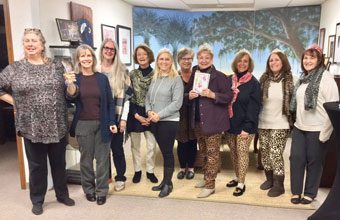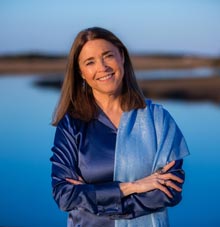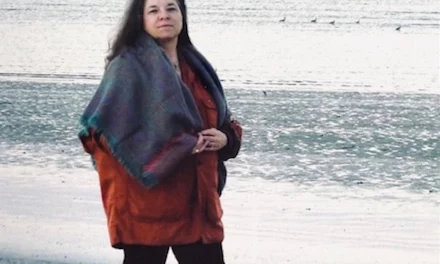 Day has slightly overtaken night. Flowering trees amorously erupt yellow pollen onto your skin. All of nature desires admiration, and the poets are as demanding for attention as clamorous crows. It must be April, National Poetry Month, which means you are in luck of seeing Beaufort’s Otram Slabess Poets in full bloom at two readings this month.
Day has slightly overtaken night. Flowering trees amorously erupt yellow pollen onto your skin. All of nature desires admiration, and the poets are as demanding for attention as clamorous crows. It must be April, National Poetry Month, which means you are in luck of seeing Beaufort’s Otram Slabess Poets in full bloom at two readings this month.
A writers group named after a 13thcentury Persian poet, Otram Slabess Poets was founded in the early years of this millennium. Over time the members have changed; but currently, the group includes Jacquelyn Markham, Olivia Stiffler, Emily Davis-Fletcher, Warren Slesinger and Quitman Marshall.
On Saturday, April 13, we celebrate National Poetry Month with a gala at 3 pm at the Charles Street Gallery in downtown Beaufort, which has been our abiding, beautiful, and generous host since 2007. Writers and musicians are invited to perform on the open mic after a reading by the featured poets of Otram Slabess.
The Pat Conroy Center hosts our second reading on Saturday, April 27, at 5 pm,which showcases ten poets featured in Archive, a new anthology of work from South Carolina poets, published by Ninety-Six Press.
With pollen in your hair and your senses indulged, Otram Slabess Poets hope you will feel a spark of wonder that is poetry in everything you do this April. Join us at our readings, find us online at: otramslabess.wordpress.com, and be part of our poetry dialogue.
Below the poets respond to some questions on their work and where it originates.
What does it really mean to “compose” a poem?
Warren: To form a pattern and find more meaning in a sequence of thoughts and emotions.
Jackie: Composing a poem is like giving birth to it. Denise Levertov wrote that the poem begins when “feeling warms the intellect” which I would compare to the gestation period; It could take an hour or a decade.
Quitman: There is some phrase or bit of language that begins to bloom with resonance for you. Memories may arise with more clarity and emotional force than you had reason to expect. The language circles around this, often repeating itself in slightly different forms.
Olivia:To nail down an idea with language, as a composer of music uses notes.
Emily: Writing is a process of discovery. I play in the dark with a spark that carries some emotion for me – a phrase, an image, a memory. I aim to hold onto that emotional charge, get it onto the page, paying attention to language and sound to heighten that emotion.
What are the roots of your poetry and how do they shape it?
Warren: My life in relation to reading, listening, learning about it from others.
Jackie: The roots of my poetry are like those of a tree and by tapping into these tangled hidden places, excavating my deep emotions, I can nourish something above ground that wants to live in the light.
Quitman: Poetry (and my effort in it) comes from language resonant with personal meaning that the poet has the audacity to hope and believe could have meaning for others. The poet’s work is to follow that audacity and try to realize that hope.
Olivia:The stories of my experiences, the feelings they embody, the significance I assign them.
Emily: Everything that happens to me informs my poetry. My intuition. My senses. I write from experience, I am compelled to tell my truths.
If someone says to you, “I’m a poet,” what do you think of?
Warren: I am embarrassed because most people are not readers of poetry.
Jackie: I think: here is a kindred spirit, someone who sees the extraordinary in the ordinary and someone who believes that truth and beauty can change the world.
Quitman:Have you really done the work, my friend? Look at the stars and tell me something.
Olivia:I think poets get a bad rap, at least in this country, that the word itself is associated with the frivolous and/or the esoteric.
Emily: How wonderful that you know yourself and are proud of who you are. You’ve embraced the calling we all have from our inner voice to wonder and reflect. I love most poets I’ve met, except those who gossip, slow clap at readings, write poems in praise of bacon.
What is the function and attraction of a poetry reading?
Warren:It gives other people a chance to take it seriously.
Jackie: The very nature of poetry requires it be read, performed, sung aloud. The sound of language sliding from the tongue gives poetry its power. Poetry readings, like poetry itself, are essential because as the late Audre Lorde wrote, “poetry is not a luxury.”
Quitman: There’s little attraction and function for a poetry reading in a culture that does not value poetry or the search for truth. It’s been said that the latter will set you free, but truth is a personal thing. Language can reveal scales of truth in surprising and even beautiful ways. Poetry readings can put this language/truth/beauty sandwich before a public: it’s stripped down theater and celebration of a language we share, even if we don’t know it. Audiences need to be open to their own ignorance, but also beware: poets and writers can be psychopaths. Our group puts on readings to celebrate poetry in this town, to assert a bit of our place in it, and to suggest, as Charles Simic put it, “somewhere among us a stone is taking notes.”
Olivia: The function is to share the genre with others and promote the art. Attraction? Hearing what others have to say in their unique creations.
Emily: To amuse our audience; but, mostly to amuse ourselves—the poets. It’s our version of a Vegas show stripped down to language. We are creating magic, spinning new versions of timeless human truths.
Imagine you are a fairytale villain. Describe yourself and your wicked superpower.
Warren: This is beyond my range of memory even though I raised three children
who are now adults.
Jackie: As I am a good witch who does no harm, I must imagine myself as a witchy villain, concocting potions from bitter roots, poisonous berries, and animal bones. I can and will stir up a powerful spell against all perpetrators of sexual harassment! Beware!
Quitman: I am a mild-mannered, happy villain, who has the power, with a glance, a touch, a wave of the hand, to turn cellphones, computers, and the headquarters of Facebook and other lords of the universe into topsoil, beautiful rich topsoil. No person will be hurt. The lords, having more topsoil around them, will be forced to become organic farmers.
Olivia: Surely a fairy tale villain could stick a sword into the political establishment? Or would that be a fairy tale hero/heroine?
Emily: I am the last balletic-limbed oak left standing to make room for new development. I send fire ants into every romantic embrace to bite couples in the tenderest of places until they tear apart, scratching welts, frustrated. The ants are a bearer of patience, my patience.
Otram Slabbess poets from left to right: Warren Slesinger, Emily Davis-Fletcher, Quitman Marshall, Jacquelyn Markham, and Olivia Stiffler. Photo by Kristy Wood






